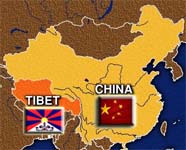Tibetan New Year gets mixed reception in China
 China - Tibetans in north-western China's Qinghai province gave a mixed response on Wednesday to calls to boycott New Year celebrations by Tibetan exile groups and counter-demands by the government to mark the day as normal.
China - Tibetans in north-western China's Qinghai province gave a mixed response on Wednesday to calls to boycott New Year celebrations by Tibetan exile groups and counter-demands by the government to mark the day as normal.
Hundreds of ordinary Tibetans celebrated the day by partying at the famous Ta'ersi Monastery (Kumbum in Tibetan) near the provincial capital of Xining, but some Tibetan Buddhist monks said they would not mark the traditional New Year.
A monk from the remote prefecture of Guoluo (Golok in Tibetan) laughed nervously when asked if he was marking the New Year, which began on Wednesday.
"We're not celebrating," the monk told Deutsche Presse-Agentur dpa as he strolled along a main street in Xining.
At Qinghai's Rebkhong monastery on Tuesday, three monks also said no festivities were planned there.
"We don't have a happy life. We have no freedom," said one of the three monks, whose name was not used to protect him from possible punishment by Chinese officials.
"We are not celebrating the New Year," the monk told dpa.
The Rebkong monks confirmed reports by Tibetan exile groups that paramilitary police arrested more than 100 monks last March after protests in support of Tibetan independence and the Dalai Lama, the exiled leader of Tibetan Buddhists.
In light snow on Wednesday afternoon, Ta'ersi was busy with Tibetan pilgrims making circumambulations and prostrations in front of and around the many temples.
Several Tibetans said they were visiting Ta'ersi specially for the New Year.
But monks and tour guides said the monastery held no ceremony on Wednesday and had officially marked the Tibetan New Year during last month's Chinese Spring Festival.
One group of five Tibetan men and women said they had driven about 300 kilometres from Qinghai's Xinghai (Tsigorthang) county to celebrate the New Year at Ta'ersi.
"There are many ordinary people coming to pray today because it's the first day of the Tibetan calendar," said a monk at the monastery's Tsong Khapa Hall.
Tsong Khapa is the 14th-century monk whose teachings launched the Gelugpa sect, which now dominates Tibetan Buddhism and is headed by the Dalai Lama. Ta'ersi was built to mark Tsong Khapa's birthplace.
The local Xining Evening News ran a front-page photograph of Tibetan dancers, under the headline "Our province's Tibetan compatriots celebrate the Tibetan New Year."
The dance was part of a government-organized gala performance at Xining's Victory Hotel to celebrate the event on Tuesday night, the newspaper reported.
"February 25 is the traditional Tibetan New Year," it said. "It is the Tibetan people's most solemn and magnificent traditional festival."
Chinese authorities appear to have increased security in Tibetan areas in the run-up to the anniversaries of widespread rioting last year and the 50th anniversary of the flight into exile of the Dalai Lama.
Several police cars were inside the Ta'ersi temple complex, while convoys with military trucks could be seen on the roads of Qinghai.
About 20 per cent of the province's population of around five million are Tibetans. The old Tibetan province of Amdo stretches into wide areas of Qinghai.
Police in Litang town, which is part of Ganzi in Sichuan province, this week arrested about 20 people after small protests, a Tibetan exile group said.
In the Tibet Autonomous Region, which borders Qinghai, top Communist Party, government and military officials last week held a video conference to discuss maintaining stability and "defeating separatism" during several sensitive anniversaries this year.
Foreign journalists are not allowed to travel freely to Tibet or some other Tibetan regions in neighboring provinces.
"The situation in Tibet is stable and the social order is good," Chinese foreign ministry spokesman Ma Zhaoxu told foreign journalists in Beijing on Wednesday. "Tibet enjoys social stability and economic growth."
The spokesman rejected the call for a boycott of the Tibetan New Year. "The Dalai Lama clique is creating rumors to ruin the stability in Tibet", he said. "This attempt is doomed to fail."
Last year's protests began in Lhasa, the Tibet regional capital, on March 10, the 49th anniversary of a failed Tibetan uprising against Chinese rule.
The government said 19 people were killed in the rioting but the Tibetan government-in-exile said up to 200 people were killed, most of them Tibetans shot by Chinese paramilitary police.
Last week China said 76 people were sentenced to prison for their role in the Lhasa rioting. (dpa)